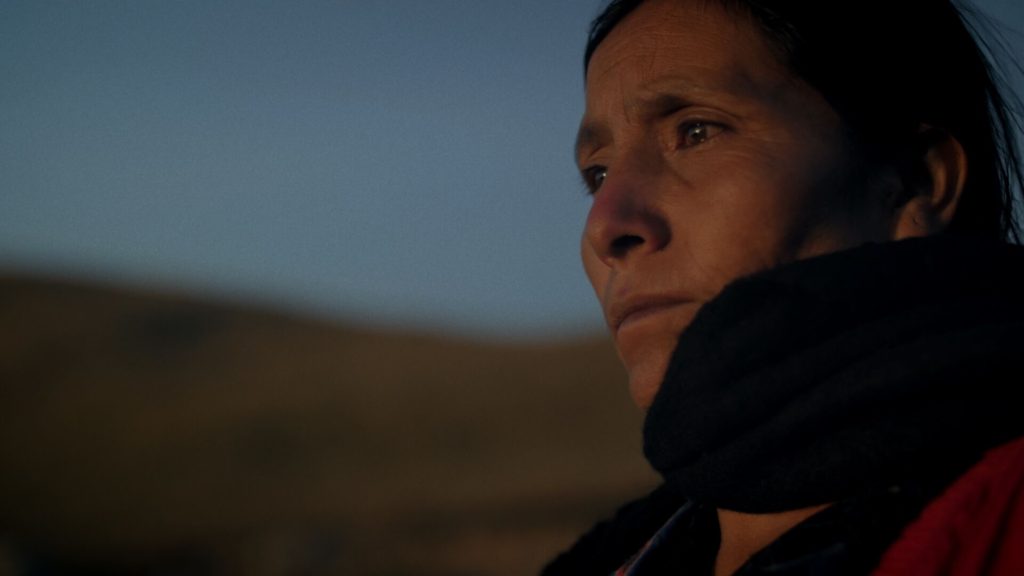Claudia Sparrow was born and raised in Lima, Peru. Her first feature, “I Remember You,” won best dramatic feature film at the Downtown Film Festival Los Angeles and was released theatrically in 2016. Her 2009 American Film Institute thesis film “El Americano,” shot in Lima and Los Angeles, was awarded an Academy of Television Arts & Sciences Student Emmy for Best Drama. Sparrow is a 2018 Film Independent Fellow and a 2017 Sundance Alumna.
“Maxima” will premiere at the 2019 Hot Docs Canadian International Documentary Festival on April 27.
W&H: Describe the film for us in your own words.
CS: “Maxima” tells the story of a real life heroine, a woman who decided to fight for what she believes is right and who didn’t let anyone silence her. Máxima Acuña, the protagonist of our film, is a farmer from the Peruvian Andes who can’t read or write; she’s probably one of the most vulnerable people that you can think of, yet nothing stopped her from standing up to the world’s largest producer of gold.
This is the story of a woman, mother, and wife who defends land and water—critical for the survival of hundreds of thousands of people—from massive and irreversible harm by an American mining conglomerate.
W&H: What drew you to this story?
CS: Máxima’s unbelievable courage and determination. She’s such an inspiration—I think it’s impossible to see her, learn about her story, and not be completely taken in by her and her cause. I was literally unable to sleep thinking of her.
As a Peruvian woman who had the privilege of following my passion and becoming a filmmaker, I felt it was my duty to do my part and help give Máxima’s voice a larger platform.
W&H: What do you want people to think about when they are leaving the theater?
CS: I would love for them to be deeply moved and inspired by Máxima Acuña and to realize that stories like Máxima’s—in which corporations manage to get away with human rights abuses and environmental crimes—are unfortunately happening too often all around the world, and we can’t allow that.
In Máxima’s situation, there are ways to support her cause, so hopefully people feel inspired enough to join her fight and help her case set a major precedent.
W&H: What was the biggest challenge in making the film?
CS: Getting financing for a socially themed documentary that is mostly in Spanish. It almost seemed impossible. Then, from the the little financing we did manage to get, we had to get a film crew to the most remote location in the Peruvian Andes with freezing temperatures and no access to electricity or running water. Plus there were all the risks associated with shooting in an area of social conflict with a strong security presence from the mining company.
W&H: How did you get your film funded? Share some insights into how you got the film made.
CS: It ended up being a combination of personal funds, a couple of angel investors, and donations. We got amazing support from Film Independent as well as a small grant that was part of the Film Independent documentary lab, but that was it. We applied to all applicable grants out there and got none.
I was incredibly fortunate to have a producer and team of executive producers unwilling to give up and always ready to think outside the box in order to get the film made.
W&H: What inspired you to become a filmmaker?
CS: My dad was a cinephile, so watching films was our main family activity growing up. Back then, there were hardly any movie theaters around, but my dad managed to find the few hidden places available to rent movies from. I quickly fell in love with visual storytelling.
Filmmaking is such a powerful art form and the way that it can transform you in a couple of hours is such a unique experience. From a young age, I dreamt of creating that magic for audiences.
W&H: What’s the best advice you’ve received?
CS: A producer told me early on in my career to always trust my instincts. It may sound like something obvious, but as an independent filmmaker, you face so many challenges at any given moment that following your instincts might seem inconvenient at times. It’s really important that you do because that’s what will set your work apart.
W&H: What advice do you have for other female directors?
CS: Don’t be afraid to tackle themes and stories that may cater mostly to a female audience. This is much easier said than done because it is a male-dominated industry, and it is tempting to give in to it especially when you are starting out, but it’s our job to continue to prove that female-driven content has as much demand and commercial viability as any other.
W&H: Name your favorite woman-directed film and why.
CS: I adore “Big,” directed by Penny Marshall. That was a classic in my house and the type of Hollywood film that I grew up watching that made me fall in love with filmmaking. “Big” is so full of innocence and magic, which is rare to find in movies these days, sadly.
W&H: It’s been a little over a year since the reckoning in Hollywood and the global film industry began. What differences have you noticed since the #MeToo and #TimesUp movements launched?
CS: The main thing for me was that certain behaviors and language that I had to shrug off before—even among friends and colleagues—are now simply unacceptable, so I experience a lot less of it.
For a change, I am also being told that it’s a great time to be a Hispanic woman director. I don’t know about that, but at least I’m getting more meetings because of it.







